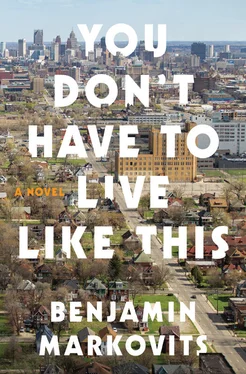But the cop insisted it wasn’t Sandy, it was Waites who told him, “I was just trying to get in his way.” “I know what I heard,” the cop tweeted, after the story ran. He got in trouble for that and was eventually suspended with pay. What nobody wrote about, but what you couldn’t help noticing, was the extra police cars on our streets, driving slowly, even in the middle of the afternoon. The atmosphere was changing, people were taking sides.
GLORIA AND I HAD A drawn-out fight about the whole thing. I mean, it just simmered away, and sometimes it boiled over.
There were all kinds of stories coming out about this Waites guy. His father was a Bircher, a lawyer in Memphis, which is where Waites grew up. He went to law school in Memphis, too, but dropped out after a year to go into real estate. His business partner was another law school dropout, an African American, as it happens, who used to play power forward for the Memphis Tigers. They had big-name backers, including some local sports personalities, ex — NFL players, and they made some money at first and then overextended themselves. Waites and his partner had a falling-out; the company was still involved in litigation.
Then Waites launched an Internet business, a website that organized people’s online lives. The idea was, you set up one account with him and used it to access and pay for all other services on the web. You had just one username, one password, one set of payment details. In practice, it turned out to be a front for people who wanted to look at hard-core pornography and cover their tracks. The Times quoted Waites as saying, “You can’t blame me for the human condition. I offer a service. What people use it for is their business.” He was still running this site from Detroit and the Times piece gave him a lot of free publicity. (They ran a follow-up story about it.)
The implication was, these are the kind of people who moved to Detroit. Law school dropouts, shady businessmen, porn pushers; rich kids who couldn’t make it on Daddy’s dime. Life’s unattractive failures. Steve Zipp knew Tyler Waites — he helped him out with his accounts. What Steve said to me is this. Once the press starts looking at your life, forget about it. We all look like jerks. Tyler’s not so bad.
But would he run down a black kid in his car? That was the question, and for some reason people wanted to answer it biographically. They made a big deal about the Bircher connection. For Gloria, it was the end of the story. Of course, he ran him down.
“You can’t have a daddy like that and not be poisoned by it. It’s a split-second thing. You hear somebody shout, Stop, thief, and you see this black kid, and he’s getting away. So you put your foot on the pedal, a little bit.”
“But he didn’t shout, Stop, thief,” I said. “He shouted, Hey, you. There’s a difference. Who knows what hey, you means. And Tyler wasn’t on speaking terms with his father.”
“Oh, that’s just because— That’s not because Tyler hated him, or anything like that. That’s just because his daddy thought he was a loser and a borderline criminal. He didn’t want to have anything to do with Tyler, not the other way around.”
“How can you say such things so confidently about these people? You never even met him.”
“Believe me, I met a few Tyler Waites.”
“And the reason his father wouldn’t speak to him is that he went into business with a black guy. And dropped out of law school. So what if he did. I’ve quit a few things in my time.”
“That’s all this is,” Gloria said. “You think I’m mad at you.”
“Aren’t you?”
“Little bit,” she said. “For taking his side.”
“I’m not taking anyone’s side.”
“Sure you are. You just don’t know it yet.”
There was a columnist at the Chicago Tribune who argued that anyone who had moved to the “Communist-style society of this Detroit development” must be considered “innocent of any connection to the Birchers.” He went on: “In this place, the State (by which I mean one Robert James) controls all the rents, heavily subsidizes the local bus service, offers universal health care and even employs a number of its citizens on a nationalized urban farm . They may as well put up a sign on the Freeway exit: No Bircher Need Apply.”
I wasn’t so sure about that, either. A lot of my neighbors were left-wing hippies, it’s true, potheads and Marxists and VW-caravan kind of mommies and daddies. But there were some NRA nuts, too, Tea Party types who thought the only solution to America’s problems was to get out and start over. One of the things I liked about New Jamestown is that most of us got along pretty well.
My real argument with Gloria was this. You can’t ever know why anybody does anything and this was a crime that depended almost entirely on motive. Did Meacher run into Waites’s car or did the car run into Meacher? Witnesses on both sides were willing to swear one thing or another. The simple fact was, car and bike had collided, and they might just as well have hit each other if Waites was trying to swerve out of the way and misjudged the angle. Which is why the whole thing came down to motive. To mens rea, as they put it in the papers: a guilty mind.
But what kind of guilty mind were we talking about? Could Waites have planned to knock Meacher down, for the sake of some preconceived idea of long-term personal advantage? Of course not. So what do we mean by guilty mind in this case? A racist inclination? Because every white American male of his generation who grew up in a town like Memphis was going to have something in his past, a connection or relation or association, something he did or said or somebody he knew, that suggested a “racist inclination.” If that was the test then Waites was always going to be guilty, then we were all guilty, even if Waites had tried to slam on the brakes he was guilty. And a test that everybody fails is no test — it doesn’t help you sort anyone out.
So what else could guilty mind mean? A spur-of-the-moment impulse to bump the kid? But how can you measure an impulse? Even if Waites did say to the cop, “I was just trying to get in his way,” that doesn’t mean he was right. This is the kind of explanation we come up with after the fact, but motive isn’t a fact, it’s an interpretation, the only fact in this case is that Meacher got hit.
“Please,” Gloria said. “This is starting to upset me. And last time, when it was just the same kind of thing, you took my side.”
“What do you mean, last time? About your father? Of course I took your side. But you’re the one who’s flip-flopping. In that case you tried to tell me it wasn’t about race, those people would have left a white man dying by the side of the road just the same.”
“Don’t bring him into this,” she said. “Don’t use him like that.”
“But you brought it up.”
“I guess you didn’t understand me because that’s not what I meant. I was talking about me. If I hadn’t a been scared, I’d have knocked on somebody’s door and got help. It’s all about race.”
“That’s not what you said. You’re changing your tune for some reason.”
“Are you seriously telling me that if Meacher is white, if the kid on the bike is white, that Waites would have hit him with his car ? Because he stole somebody’s phone? Are you telling me that?”
“I don’t know.”
“ Changing my tune . What does that mean.”
“It means you’re picking a fight with me about this for some reason.”
“Oh, you haven’t even seen me pick a fight.”
“I have to be able to say what I think to you. You have to trust me.”
“You can say what you think, you just got to think better. Or put up with the consequences.”
Читать дальше












